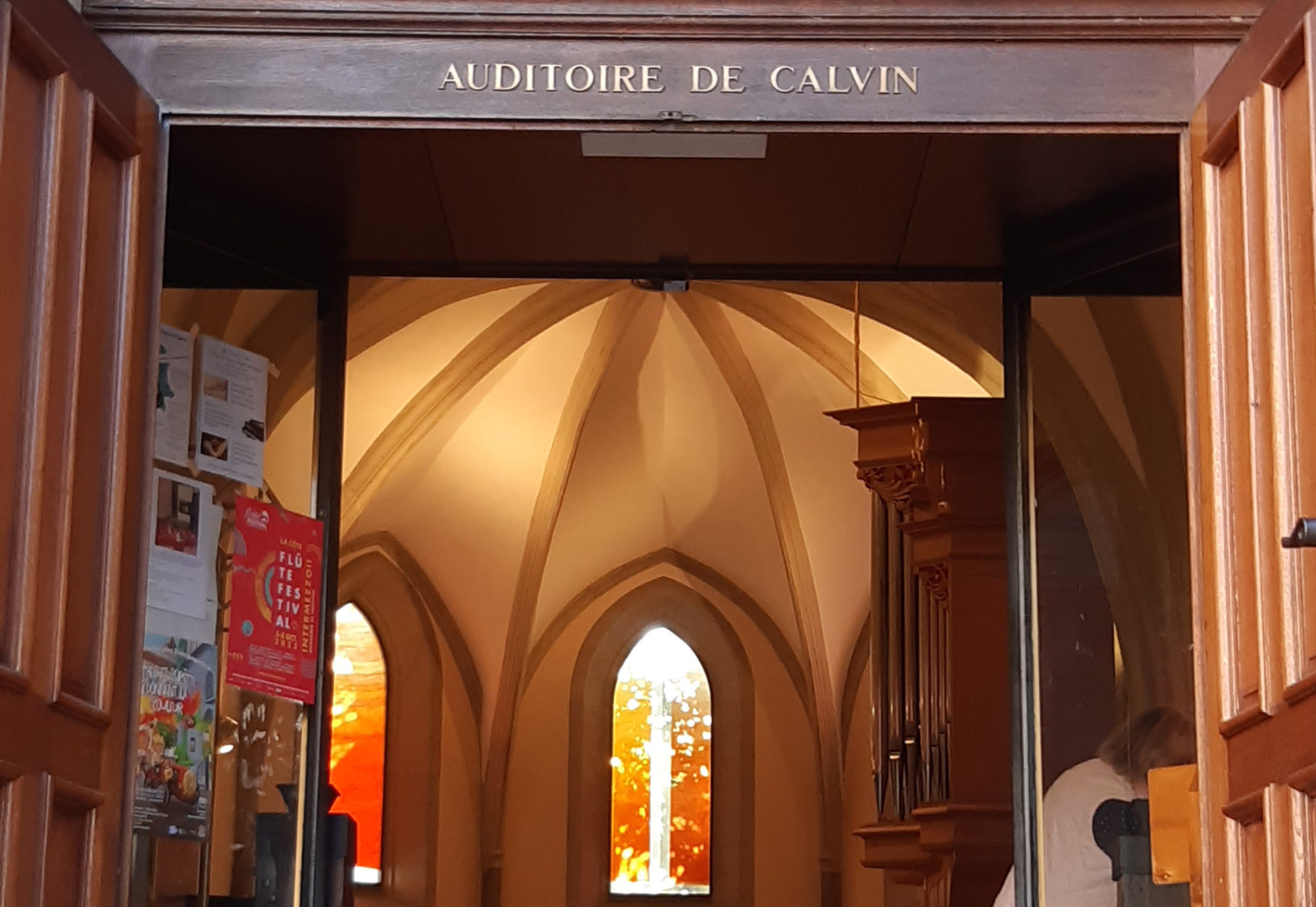Fourth Sunday after Pentecost
Isaiah 66:10–13; Psalm 66:1–9 (sung); Galatians 6:2–5, 7–11, 14–16; Luke 10:1–11, 16–20
Church of Scotland, Geneva, Auditoire de Calvin, June 29 2025
I started last week by putting on our website the five sermons preached here in June by Graham, Ewart, Mark, and myself.
To head the webpage, we found a quote from Paul’s first letter to the Corinthians.
“If I proclaim the gospel, this gives me no ground for boasting, for an obligation is laid on me, and woe to me if I do not proclaim the gospel!”
*
Years ago in Scotland, I heard a lecture by Kenneth Boyd, one of my predecessors as Scottish secretary of the Student Christian Movement. He described himself as “a jobbing theologian”. He wasn’t a “proper” theologian, a lecturer at a university or theological college, still less a prestigious professor. Theology was just something he did from time to time.
Graham is, of course, a proper preacher: He’s the minister of the Scots International Kirk, Rotterdam, and Geneva and Lausanne are just his little bits on the side.
The rest of us are jobbing preachers. Preaching is something we do from time to time; and I’m sorry to tell you that for the next eleven Sundays, I shall do it six times. You can always think about Sunday lunch.
But whether we do it regularly or occasionally, the job is to preach the gospel, just like Paul, and just like the 72 sent out by Jesus in today’s Gospel.
*
Graham reminded us at the beginning of June that Luke doesn’t do things by halves. Luke likes to do them by twos.
He doesn’t just write a Gospel, like the other evangelists. He also writes a second book – the Acts of the Apostles.
Luke chapter 9 begins with Jesus sending out the 12: 12 disciples who symbolize the whole of God’s people, the 12 tribes of Israel. This story Luke shares with Matthew and Mark. But now, a chapter later, in a story unique to Luke, Jesus sends out 72 disciples – or is it, as in some manuscripts of the Gospel, just 70?
Luke doesn’t pick these numbers at random. Most likely, they reflect the list we find, in Genesis chapter 10, of the nations descended from Noah and his three sons Shem, Ham, and Japheth: 70 in the Hebrew, 72 in the Greek. In other words, all the nations of the earth.[1] Luke, it seems, is not simply duplicating a story but also looking ahead to his second book.
In his earthly ministry, Jesus saw himself as sent only to the lost sheep of Israel; but in this story, it seems, Luke is looking forward to a time when the risen Jesus will send his followers to witness to him “in Jerusalem, in all Judea and Samaria, and to the ends of the earth”.[2]
Luke is looking forward, in short, to the time of the church. He is looking forward to us and our time.
*
As our communion hymn, we shall sing “Come and find the quiet centre” (CH4 716).
Where are we to find this centre?
Isaiah of Jerusalem was an eighth-century prophet in the kingdom of Judah. The Book of Isaiah bears his name; but much of it seems to date from two later periods: the time when the leading families of Judah were carried off into exile in Babylon and the time when Cyrus of Persia gave them permission to return to Jerusalem and some of them did that.
For Isaiah and the book that bears his name, the centre is found precisely in Jerusalem, capital city and symbolic centre of the people of Judah, God’s chosen people.
The passage Mary read to us comes from the last chapter of the book. The exiles, or some of them, may have returned to Jerusalem; but it seems the exile isn’t really over. Jerusalem is not yet fully the centre from which God reigns over all the earth. When contrasted with the splendid visions from the period of exile, it’s an thoroughly unsatisfactory state of affairs. So the prophecy looks forward to a time, still to come, when Jerusalem will nurse God’s people as a mother nurses her child, and God will comfort God’s people as a mother comforts her child. It looks forward to a future act and time of salvation.
For Luke, and the other writers of the New Testament, the climactic act of salvation happens in Jerusalem but is not centred on Jerusalem. It is centred on Jesus of Nazareth, his death and resurrection. It redefines the people of God around him. From this new centre – a person now and not a place – the good news goes out from Jerusalem to all the earth. And that is where we come in.
*
Yesterday afternoon, Vivien and I were down the road in the Temple de Crassier to celebrate the “priesting” of our friend Betty Talbot – her ordination as a priest in the Church of England.
Bishop Alison White introduced the service in standard words:
“God calls his people to follow Christ, and forms us into a royal priesthood, a holy nation, to declare the wonderful deeds of him who has called us out of darkness into his marvellous light.
“The church is the body of Christ, the people of God and the dwelling-place of the Holy Spirit. In baptism the whole church is summoned to witness to God’s love and to work for the coming of his kingdom.”
This isn’t a specifically Anglican view. It is the view, to repeat Alison’s phrase, of the whole church. This is who we Christians are. This is what we Christians are called to be and to do. We are sent as labourers in God’s harvest.
But in today’s vineyard or wheatfield, we face a different set of challenges from this morning’s story.
Jesus sends the 72 out as “lambs among wolves”. If what he was doing was dangerous, so was their work then, and for several centuries afterwards. So too has been the work of Christian labourers in many times and places.
But we are not sent out as lambs among wolves. No one is seeking to devour us. We are sent rather as lambs among vegetarians. If we dare to speak of God or Jesus, the greatest risk we run is indifference. These are not topics to introduce into polite conversation. And yet it is still our task to witness to God’s love and to work for the coming of God’s kingdom.
How are we to do this?
Well, we know how not to do it. When Ewart used this illustration in his sermon last month, I wasn’t the only one in church who shuddered:
“I think we’ve all walked down a street and heard someone trying to preach or sell a supposedly religious message… Isn’t the typical reaction… simply to shrug it off and hope to get away before getting cornered by this slightly deranged character, especially if they’re smelling of drink?”
So maybe not like that.
On the other hand, Augustine of Hippo writes in his Confessions: “You have made us for yourself, and our hearts are restless until they rest in you.”[3]
There are moments in everyone’s life that bring them near to this truth: moments of sorrow, moments of joy.
In such moments, maybe we can help them go all the way – by speaking simply of our own experience and our own faith. We should not shrink from speaking in such moments when they arise.
To be sure, to talk to others about our faith takes us out of our comfort zone. But sometimes it’s our job to tempt people out of their comfort zone.
Traditionally we pray: Let there be peace on earth, and let it begin with me. We may also pray: Let the good news of Jesus Christ be spread through all the earth, and let it begin with us.
All God’s people are from time to time to tell the story of God’s love. It’s not a job we can subcontract to others.
The mildly alarming truth I’ve been sidling up to is this: We are all jobbing preachers. Preaching is something we all get to do from time to time.
[1] Fred Craddock, Luke. Interpretation: A Bible Commentary for Teaching and Preaching (Louisville, KY. Westminster John Knox Press, 2009)
[2] See Joachim Jeremias, Jesus’ Promise to the Nations (London: SCM Press, 1958)
[3] Augustine of Hippo, Confessions (Oxford: Oxford World Classics, 1998)

